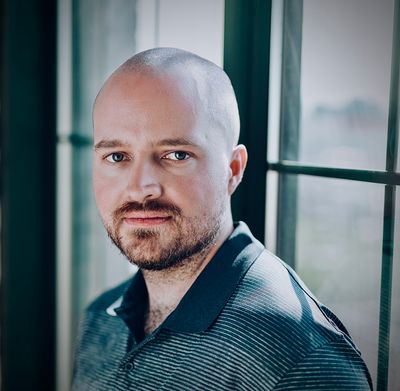In November of 2022, Foster Collective began rebuilding its media strategy from scratch.
We had two goals in mind—become more adaptable in a turbulent world, and be the change we want to see in internet media. This essay lays out the more beautiful future we imagine for writers, along with our playbook for co-authoring that future.
Our plan is to break many of the rules that have come to define the status quo of digital media, and we want to be fully transparent about how we’re doing that and why. Although this strategy is custom-tailored for our organization, we believe most aspects of it can be adapted to suit solo creators, content marketers, and indie media companies.
So if any of this resonates, please feel free to borrow, remix, and adapt anything you see here. Then come join us out on the frontier.
The future we’re fighting for
We don’t know what the future holds for writers, or for organizations like ours. Nobody does. The media frontier stretches out before us—vast, uncertain, unknowable. But the thrilling thing about frontiers is that they’re malleable. Early explorers and expeditions always wield outsize influence on the new worlds built in their footsteps. As we enter this new era of media, each of us wields more power than ever to question the status quo, and model new paths forward.
With that in mind, we’ve woven a few core beliefs into our strategy, in the hope that they’ll help us nudge the media landscape in a healthier and more human direction.
We believe.
- The future of internet media is less, but better. Time and attention are precious, finite resources. How we spend them determines the quality of our lives. We believe media practitioners have a responsibility to treat time and attention as sacred, refusing to churn out commoditized filler content or algorithmic bait, and instead only ask for attention when we have something to say. Likewise, as generative AI fills the internet with unfathomable amounts of noise, we believe audiences will come to trust and cherish the creatives who most respect their time.
- The media economy of the future will disproportionately reward perspectives that AI can't replicate. For us, that means a shift towards writing that’s personal, honest, courageous. It’ll be less about projecting expertise and authority on generalized topics—something which AI increasingly excels at—and more about individuals weaving the threads of their own experience into stories that could otherwise never exist.
- The future of internet media will be fluidly collaborative. Individual expression is vital, but writers and creatives are capable of so much more, both artistically and economically, when working together and sharing resources. Emerging technologies will give us new tools and norms for collaborating, sharing in the economic upside, and maintaining our freedom from exploitative institutions and paradigms.
- The future of internet media will be pluralistic. Our current landscape floods our collective consciousness with simplistic, emotionally-addictive narratives that fuel division and distrust, while alienating us from the vibrant complexity and diversity of our world. We believe the future of internet media will break echo chambers by allowing competing and compelling perspectives to live alongside one another. When those perspectives originate from individual humans, instead of generalized caricatures, it will begin to break down the emotional barriers that keep us from seeing each other and working together towards a more beautiful world.
Whether or not these beliefs are objectively “true” is besides the point. This is the future we want for ourselves as writers. Everyone in the Foster Collective has endured years of frustration with the status quo of internet media. It's part of what brought us together. So we’ve decided to bake these beliefs into our strategy, and we will act as if they are true. Perhaps it’s naive. But it’s never the cynics who change the world for the better. It’s the dreamers and doers. The following playbook is for people, like us, who understand the optimistic path is the more challenging one, but choose it anyway.
Foster's self-renewing media strategy
Here's our new strategy in a nutshell. In 2023, we're shifting away from a traditional content marketing playbook, where we publish one essay per week about the craft or business of writing. And we’re pivoting to being a scrappy, self-renewing digital magazine that features personal perspectives across a diverse range of topics. We're breaking free from the insular "writing about writing" space, and betting big on showcasing the humanity of our writers.
The most important part of the strategy is that it’s cyclical and spacious. Every six to eight weeks, we will release one new edition. Each edition will center around a core theme that's alive for us, and will feature a handful of personal essays from writers within and beyond our collective. With every edition, we’ll be running experiments and trying things that excite us, and when a publication cycle comes to an end, we’ll have time to reflect, retool, and get ready to start anew. Every new edition is another opportunity to be the change we wish to see in digital media.
There are three counterintuitive principles that make this strategy ideal for the unknown frontiers that lie ahead:
- Publishing cyclically to maximize opportunity for experimentation and renewal
- Going niche-less to create media that’s vibrant, diverse, and unmistakably human
- Creating fluid playbooks to meet our changing needs amidst a shifting landscape
Following these guidelines, we plan to publish eight editions in 2023, and wrap up with a retrospective at the end of the year. But for now, here's the full story behind each of the three principles above.
Slow, cyclical publishing for ongoing renewal
As the world of media changes, our goal is to joyfully change alongside it. It’s far too easy to stay locked into rigid old strategies, either out of fear of change, or out of institutional inability to move quickly. Pivoting a media organization towards anything new or uncertain is no small task, especially when the existing structure disincentivizes change.
Back when we were publishing weekly, it always felt like running on a treadmill, with little time to catch our breath, let alone question our strategy or consider new experiments. We poured all of our collective energy into getting the next piece out the door. Then the next one, and the next, ad infinitum. Most of us come from content marketing backgrounds, so we’ve had the dogma that consistency is essential drilled into us. Yet when we prioritized weekly publishing above all else, it felt like we were trapped in a prison of our own making. We all yearned to be innovating and taking editorial risks, but the structure we’d built robbed us of the mental and emotional resources to do it.
The most radical thing about our new structure is that it gives us ample breathing room. Spaciousness is the secret ingredient. Every publication cycle comes with natural intervals for planning, intense work, reflection, and rest. Instead of forever jogging on the treadmill at a brisk pace, we now do intervals and sprints, while consistently checking in with our legs and vitals.
This cyclical structure creates the opportunity for ongoing reinvention, without throwing away the work we’ve done in the past. We’re viewing each edition as a standalone media asset, which we can keep using and repurposing even as our organization evolves. And evolve we will. Working cyclically will speed up our ability to run experiments and create iterative feedback loops based on real-world experience. It will allow us to orient everything we create around what feels most alive in the present moment. We’ve all experienced what it’s like to stay chained to an editorial strategy that feels stale and uninspired. But now, every six to eight weeks, we get another chance to try something new, courageous, or fun.
This structure lightens the emotional burden of change, and makes us feel safer in taking risks. And it creates a reliable rhythm, where we always have the opportunity to reorient towards what's most alive.
In week one of a new publication cycle, we’ll kick things off with an editorial meeting. We’ll ask, “What excites us right now? What could we experiment with? What’s something crazy enough that it might just work?” Then we get to go all-in on that direction for a few weeks. Because none of these changes are permanent, our ideas don’t always have to be perfectly safe, logical, or conform to what anyone else is doing. If an idea genuinely excites us, that’s reason enough to take it seriously for a month or two. This structure lightens the emotional burden of change, and makes us feel safer in taking risks. And it creates a reliable rhythm, where we always have the opportunity to reorient towards what's most alive.
In the final week of a cycle, after publication and promotion, we’ll run a debrief meeting where we’ll ask, “How did it go, and what did we learn? What signals is the world sending us? What surprised us? What could we try next time?" This is an opportunity to be honest with ourselves and each other. We will inevitably fall short of our lofty ideals and ambitions. Some of our experiments will fail completely. It’s important that we don’t sweep those instances under the rug, but instead study them and learn. For us, the thing we’re most afraid of is not failure or looking silly. We’re afraid of playing it too safe, and going back to the “best practices” that perpetuate the status quo. And so we’re committed to trying again and again, and learning as much as possible from every new experiment.
To sum it all up, we believe that slow, cyclical publishing opens up a world of adaptive possibility. Each cycle is an opportunity to experiment and take risks, And as we increase the number of ideas we try, we’ll increase the amount we learn about the emerging media frontier, which will help us adapt and thrive as an organization.
Going niche-less to create unmistakably human media
The prevailing wisdom is that to succeed in internet media, your work must be hyper-niche and specialized. It’s all about finding a singular, narrow market to serve, then adding as much specific value as possible. For years, this has been the most reliable strategy for earning attention in our competitive digital landscape. That recipe applies equally to solo creators, content marketers, and indie media companies. Niche down or perish, the story goes.
Since our founding in 2020, Foster has been operating in and around the “online writing” niche. It’s a media subculture largely catering to affluent knowledge workers, and the landscape is dotted by countless “how to” guides for aspiring writers. How to write authentically. How to get more email subscribers. How to choose the right newsletter platform. And so on. The "niche down and add value" strategy worked for us early on, and helped get us to where we are today. But truthfully, the space is now awash with content, much of it indistinguishable from the rest. And that was true even before generative AI entered the scene.
What happens when AI begins producing educational, value-adding content just as well, if not better, than humans can? What happens when the vast majority of internet subcultures are flooded with “authoritative” advice and generalized perspectives? What happens when following today’s best practices turns you into tomorrow’s commodity?
We've been sitting with these questions over the last few months, and the one ideal we always come back to is that Foster is an organization for humans, by humans. And humans, by our nature, are never just one thing. None of us can be defined by a niche we belong to, and our value doesn’t hinge on the practical perspectives we share. We all contain a multiplicity of identity and personality traits, and we’ve all experienced a life that is uniquely our own. What’s not commodified, and never will be, are those individual perspectives. AI is only as powerful as the datasets it’s trained on, and your unique experiences, perspectives, and stories don't live on a server. The only place they exist is within yourself.
As the world changes, we believe our greatest strength will be the full expression of the diverse perspectives drawn from our community. The Foster Collective has been populated by fascinating humans since day one, and now we want our media strategy to reflect that. We believe that by breaking away from "adding value" to a specific niche, we will begin to create unmistakably human writing. Writing that couldn’t ever come from a machine. And our bet is that over time, that media will begin to attract even more diverse writers into our community—people who we’d never reach by following the traditional niche playbook.
AI is only as powerful as the datasets it’s trained on. Your unique experiences, perspectives, and stories don't live on a server. The only place they exist is within yourself.
Our playbook for going niche-less has three ingredients. First, every new edition we publish will center around one theme, which we’ll choose based on suggestions and input from the community. In other words, we don’t know what the next seven editions will cover. Instead of enforcing an editorial agenda from the top-down, we’re creating a bottom-up emergent strategy that reflects what’s most important to the humans within our community. Second, once we’ve landed on a theme, we’ll put out a call for submissions, asking not for authoritative how-to content, but for personal perspectives and stories around that theme. And third, we’ll work to select pieces that feature differing perspectives, or that outright disagree with each other. Our goal isn’t to present simple, easily-digestible narratives. We don’t want to tell our readers what to think, but instead trust them to navigate the ambiguity and complexity of each theme for themselves.
Our bet is these ingredients—the theme, the perspectives, the tension—will make any given edition feel radically human compared to content produced by AI. When readers crack open a new edition, they’ll know they’re about to experience thoughtful, personal writing around a specific theme. They’ll also know it will be a bit messy and surprising. In a world overflowing with predictable, cookie-cutter media, we believe this combination of novelty, diversity, and humanity will become Foster’s greatest asset. We will lose out on the precision and safety of niche marketing in the short run. But in the long run, we trust this strategy will result in work we’re proud of, and help us attract more fascinating humans with stories to tell.
Creating fluid playbooks to navigate an uncertain world
As we were defining this strategy, we realized our goals as an organization are not static, and that we don’t always have to center our media operation around the same metrics. Our cyclical structure means we can optimize each edition around whatever’s most important for Foster right now. And as we run different plays for these editions, we’ll begin accumulating a library of playbooks that can help us flexibly navigate uncertain terrain.
Perhaps that sounds obvious, but it blew our minds. When we were publishing weekly, we ran the basic content marketing playbook we're all used to. We measured traffic, new email subscribers, and new customers for our writing assistance product. And sure, those are important metrics. But if that’s all our media team ever optimized for, edition after edition, we’d be doing a disservice to the complex, evolving organism that is Foster.
This insight landed right in our lap, like a gift from the media strategy gods. As we were brainstorming ideas for this first edition, Foster also raised a new round of funding. Prior to closing the round, our most important organizational goal was to become financially self-sustaining as quickly as possible. We had one year of runway, and needed our media efforts to generate immediate cashflow. In that context, optimizing for traffic, subscribers, and customers made perfect sense. But we’re not in that position anymore. Now we can channel our energy towards longer, more strategic games. And we can use each new edition to tackle different aspects of our long-term vision.
Our goal is to flourish in a future whose rules have not been written yet, and to help write those rules. That’s why we’re firm in our convictions, but ultimately optimizing for fluidity by collecting and testing multiple strategies.
At the beginning of a new publication cycle, during our editorial meeting, our core team will decide what’s most important for Foster right now. That may be acquiring new customers, attracting partnerships, promoting our seasons or retreats, recruiting contributors, expanding into new niches, experimenting with new monetization strategies, or simply having fun. Once we’ve come to consensus on a core focus for the edition, another set of questions emerges:
- Given our goal, who’s the best person to lead and edit this edition?
- What types of writing should we curate? Should we keep it internal and feature writers in the collective, or seek out guest contributors?
- What niches or subcultures should we target? Who does this media need to reach for this to be a success?
- What marketing and promotion strategies work best for this goal? How can we be precise in reaching the right people?
- How can we tailor our messaging and CTAs for this, so that next steps are abundantly clear to readers?
- Should we directly monetize this edition? If so, how? If not, what does success look like?
For example, in this current issue we decided to focus on attracting high-quality contributors—the writers and editors who populate our community and collectively edit the writing submitted via the Foster extension. Basically, we’re looking for a handful of ideologically-aligned homies who want to be part of our world for years to come. That’s why these essays feature our personal beliefs and stories so heavily. We’re trying to find the others—that small handful of writers who see the future the way we do, and who want to co-create it with us. And that’s why the only real CTA’s we’ve included here point people to the Foster contributor application, instead of our main product. It was a strategic choice, based on what we need right now.
You can see how a process like this, where we make bespoke editorial, marketing, collaboration, and monetization decisions for each edition, will lead us to trying lots of different tactics. Over time, we believe this will generate a collection of playbooks and tools that will help us be adaptable and fluid. In lean times, we’ll be able to run plays designed for immediate growth and revenue. In abundant times, we’ll optimize for experimentation and long-games. When we’re launching a new season or running a writer’s retreat, we’ll have playbooks for that. No matter what the world throws at us, we should be able to reach into our belt, and pull out the appropriate tools for the job right in front of us.
This requires more collective brainpower than executing on the same strategy with each new edition. And it may lead to friction and disagreement amongst our core team. But we’re convinced that any grand strategy we spin up today, no matter how perfect it may seem, will eventually become a liability when trying to navigate a world that’s changing as fast as ours. Our goal is to flourish in a future whose rules have not been written yet, and to help write those rules. That’s why we’re firm in our convictions, but ultimately optimizing for fluidity by collecting and testing multiple strategies. It’s like a set of Legos we can use to construct whatever we may need as we journey further onto the frontier.
An invitation to join us on the frontier
There’s plenty more we could say about this new strategy, specifically around how it’s allowing us to experiment with marketing and non-traditional leadership structures. And perhaps we’ll write about those in a future edition. But for now, these three ideas—spacious cyclicality, niche-less humanity, and fluid playbooks—are the most essential aspects of how we’re navigating the strange, uncertain new world in front of us.
Generative AI tech is here to stay, and it is going to change media and culture in ways none of us can predict or control. We're all living on the frontier now. But with this strategic foundation, we're confident that Foster will always be able to adapt, evolve, and thrive, no matter what may come. We also believe it will help us do our best work, lead by example, and leave the digital media landscape better than we found it.
If you're a writer or an editor who'd like to join us in co-creating a more beautiful media future, the best way to get involved is to join our contributor community. But for anyone else, we hope some of the ideas in this essay sparked something, and that you now feel more empowered to navigate the world to come.
Good luck out there on the frontier. And Godspeed.
-The Foster Media Team
The frontier ahead is vast and unknowable, full of opportunity and peril. We're looking for like-minded creatives to forge ahead with us and help us shape the future of internet media. If you'd like to build Foster alongside us, help writers tell their stories, and make the internet more human, we humbly invite you to apply to join our collective.





